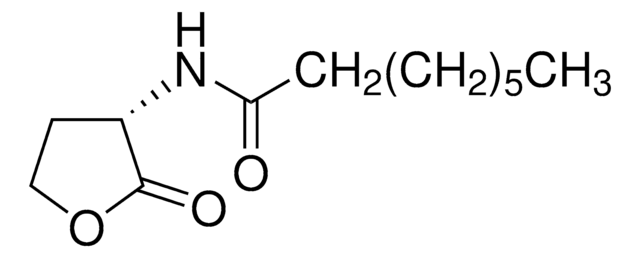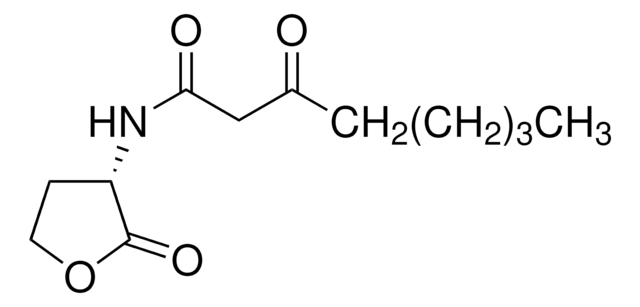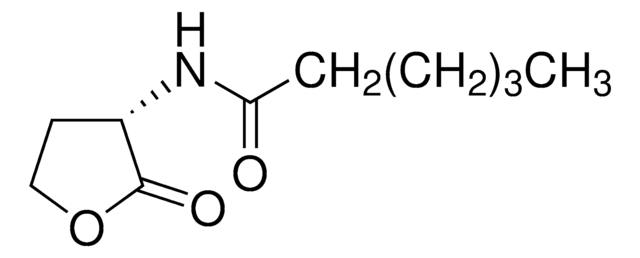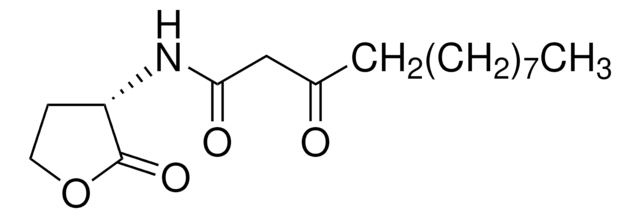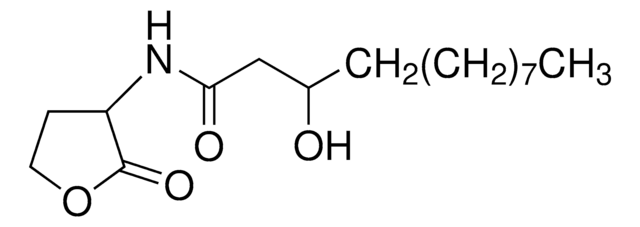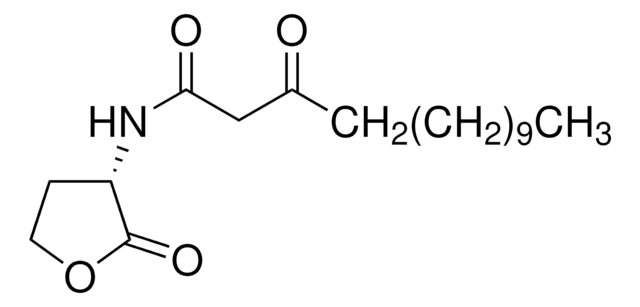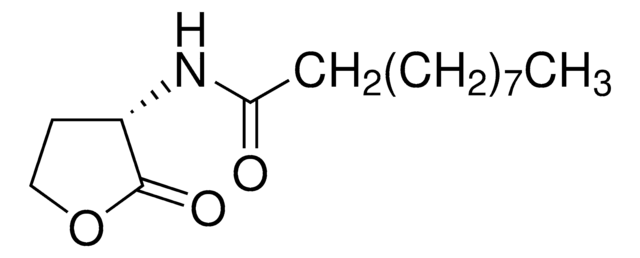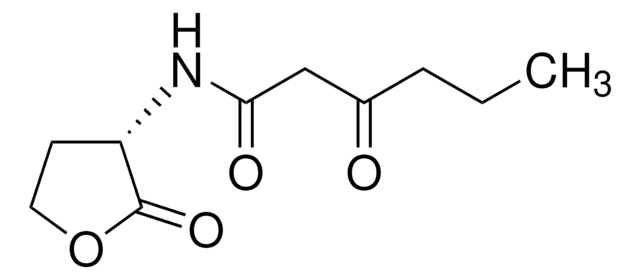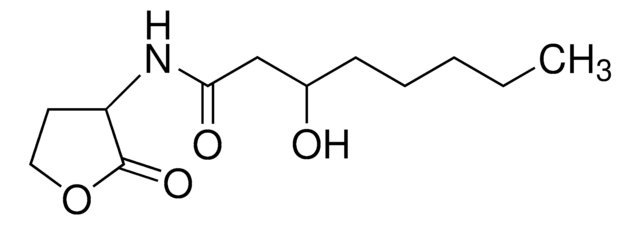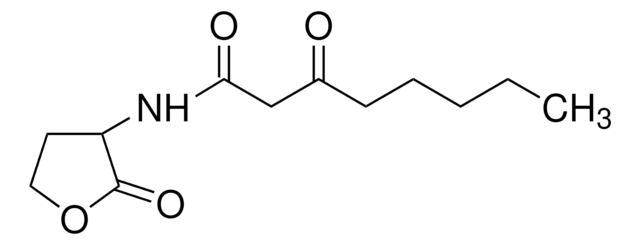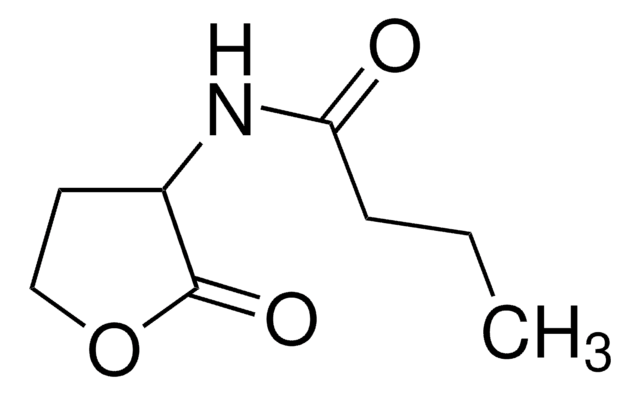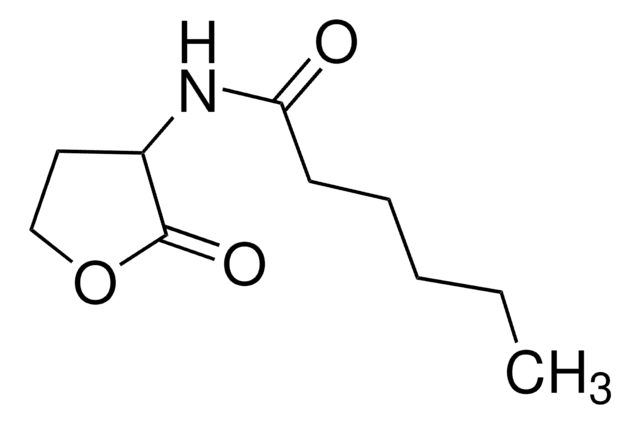Alle Fotos(1)
Wichtige Dokumente
68873
N-(3-Hydroxydecanoyl)-DL-homoserin-lacton
Synonym(e):
3-Hydroxy-N-(tetrahydro-2-oxo-3-furanyl)-decanamid, N-[(RS)-3-Hydroxydecanoyl]-DL-homoserin-lacton
Anmeldenzur Ansicht organisationsspezifischer und vertraglich vereinbarter Preise
Alle Fotos(1)
About This Item
Empirische Formel (Hill-System):
C14H25NO4
CAS-Nummer:
Molekulargewicht:
271.35
MDL-Nummer:
UNSPSC-Code:
41116134
PubChem Substanz-ID:
NACRES:
NA.25
Empfohlene Produkte
Form
powder
Qualitätsniveau
Lagertemp.
−20°C
SMILES String
O=C(CC(O)CCCCCCC)NC1C(OCC1)=O
InChI
1S/C14H25NO4/c1-2-3-4-5-6-7-11(16)10-13(17)15-12-8-9-19-14(12)18/h11-12,16H,2-10H2,1H3,(H,15,17)
InChIKey
DOICJCCMIBBSOO-UHFFFAOYSA-N
Biochem./physiol. Wirkung
N-(3-Hydroxydecanoyl)-DL-homoserine lactone is a member of N-acyl-homoserine lactone family. N-Acylhomoserine lactones (AHL) regulate gene expression in gram-negative bacteria, such as Echerichia and Salmonella, and are involved in quorum sensing, cell to cell communication among bacteria; for reviews see. Bacterial intercellular communication has become a target for the development of new anti-virulence drugs, and a research focus for the prevention of biofilm formation.
Quorum-sensing signal generation
Lagerklassenschlüssel
11 - Combustible Solids
WGK
WGK 3
Flammpunkt (°F)
Not applicable
Flammpunkt (°C)
Not applicable
Hier finden Sie alle aktuellen Versionen:
Besitzen Sie dieses Produkt bereits?
In der Dokumentenbibliothek finden Sie die Dokumentation zu den Produkten, die Sie kürzlich erworben haben.
Kunden haben sich ebenfalls angesehen
M R Parsek et al.
Proceedings of the National Academy of Sciences of the United States of America, 96(8), 4360-4365 (1999-04-14)
Acyl homoserine lactones (acyl-HSLs) are important intercellular signaling molecules used by many bacteria to monitor their population density in quorum-sensing control of gene expression. These signals are synthesized by members of the LuxI family of proteins. To understand the mechanism
Barbara Thallinger et al.
Biotechnology journal, 8(1), 97-109 (2013-01-03)
With the increasing prevalence of antibiotic resistance, antimicrobial enzymes aimed at the disruption of bacterial cellular machinery and biofilm formation are under intense investigation. Several enzyme-based products have already been commercialized for application in the healthcare, food and biomedical industries.
Margrith E Mattmann et al.
The Journal of organic chemistry, 75(20), 6737-6746 (2010-08-03)
Bacteria use small molecule signals to access their local population densities in a process called quorum sensing (QS). Once a threshold signal concentration is reached, and therefore a certain number of bacteria have assembled, bacteria use QS to change gene
Regulation of gene expression by cell-to-cell communication: acyl-homoserine lactone quorum sensing.
C Fuqua et al.
Annual review of genetics, 35, 439-468 (2001-11-09)
Quorum sensing is an example of community behavior prevalent among diverse bacterial species. The term "quorum sensing" describes the ability of a microorganism to perceive and respond to microbial population density, usually relying on the production and subsequent response to
Dilani Senadheera et al.
Advances in experimental medicine and biology, 631, 178-188 (2008-09-17)
Streptococcus mutans is the primary causative agent involved in dental caries in humans. Among important virulence factors of this pathogen, its ability to form and sustain a polysaccharide-encased biofilm (commonly called dental plaque) is vital not only to its survival
Unser Team von Wissenschaftlern verfügt über Erfahrung in allen Forschungsbereichen einschließlich Life Science, Materialwissenschaften, chemischer Synthese, Chromatographie, Analytik und vielen mehr..
Setzen Sie sich mit dem technischen Dienst in Verbindung.